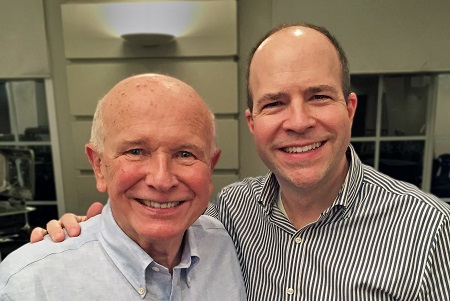Tony-winning playwright Terrence McNally (Love! Valour! Compassion!, Master Class, and Frankie and Johnny in the Clair de Lune) died on March 24, from complications due to COVID-19, at age 81. At last year's Tony Awards, McNally received an honor for lifetime achievement, and you can read his singularly memorable acceptance speech here. Another tribute to his extraordinary legacy can be read here.
I have written one fan letter in my life: to Terrence McNally, in 1998. I was acting in a production of Love! Valour! Compassion!, playing the flamboyant, open-hearted, sarcastic, musical-theatre-loving queen Buzz. Audiences loved Buzz; they guffawed at his wicked sense of humor and they wept for him when he revealed his loneliness and pain. With Love! Valour! Compassion! Terrence not only put queer characters like Buzz centerstage; he made them complicated, smart, empathetic, inspiring, imperfect, wholly dimensional human beings.
I wrote to Mr. McNally to thank him for leading me out of the closet into a big, beautiful world. His characters gave voice to my darkest secrets and shined a light on my most private fantasies. Embodying the character of Buzz encouraged me to celebrate all of those things I tried to hide from the world; everything I had come to despise about myself was now being showcased and literally applauded.
The fan letter came back to me unopened.

I met Terrence 20 years later. He came to the opening of a production of his musical Ragtime that I directed for Asolo Repertory Theatre. Shortly thereafter he asked me to collaborate on his newest play, Immortal Longings. I didn’t know it would be his last. But I did know that he was writing about a powerful man confronting his mortality, about an artist grappling with legacy when his craft is temporal, about a gay man choosing love when the world was advising him against it.
Our dramaturgical discussions always migrated into casting sessions. “I never thought I wrote literature,” he said, “I write plays for actors.” Terrence loved actors; they were his muses. He trusted them and he trusted his colleagues. One afternoon we were working in his living room, the fireplace blazing, I asked him if he wanted to see the costume research or the scenic renderings. “Absolutely,” he responded, “but I trust you.” This theatrical giant, this American treasure, this pioneer in queer representation trusted me. Not only will he live on as one of our greatest dramatists, he will be remembered as an extraordinary collaborator; he understood that great collaboration begins with trust.
Last summer we were in rehearsals for Immortal Longings at ZACH Theatre in Austin, Texas, his home state. Terrence’s lungs were struggling, and he landed in the hospital. It was 10:30 at night, I had just finished rehearsal, and my phone rang: “Terrence wants you to come to his room to discuss today’s rehearsal.” And so I did. He listened with humility and created his list of rewrites. He rewrote many scenes from his hospital bed those weeks. “Writing a first draft is easy,” he would say. “Rewriting is what makes a great playwright.”
Thankfully, Terrence was back on his feet in time for our final dress rehearsal. Immediately after watching the run he said, “The play doesn’t really start until we get to Paris. Let’s cut the first 30 pages.” And so we did. The following day, our first preview, the lights came up on Paris, page 31. Each day we put in more cuts, more rewrites, and each night we would meet over queso and discuss what we learned in front of an audience. After one preview that had gone quite well, a small group of us were rattling on about all of the good changes when Terrence interrupted: “Okay, enough congratulating ourselves, let’s get to work.” He then launched into a scene we all knew wasn’t working. I said that one of his stage directions was sending us down a specific path, and perhaps it was the wrong one. He responded, “I saw your Ragtime—you didn’t honor one of my stage directions then, why are you so loyal to them now?” He then smiled that smile that ran from one rosy cheek to the other, and his clear blue eyes sparkled.
Terrence loved to work and he never stopped working. (We had a full day of meetings scheduled for the day he died.) He gave us three dozen plays, books for 10 musicals, and four opera libretti. He gave us hundreds of characters representing the voiceless, the misunderstood, the invisible. He gave us poetry and wit and insight. He gave us ballads, arias, and anthems. He gave us a world I could never have imagined as a gay kid growing up in rural America.
Maybe it’s a good thing that my fan letter never reached Terrence. While it may have flattered him for being a great playwright, it would have fallen short in describing the extraordinary human being I later came to know: a generous, kind, humble, and beautiful soul; a true collaborator; a gentleman with a wicked sense of humor; a man who worked in the theatre for more than half a century but had the giddiness of a child watching the curtain go up for the first time. Terrence McNally believed artists have the power to change the world. He was right. And he did.
Peter Rothstein is the artistic director and co-founder of Theater Latté Da in Minneapolis and has directed shows at theatres across the U.S.

